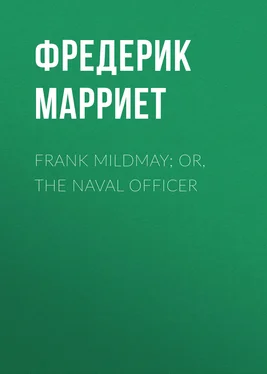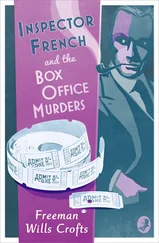Фредерик Марриет - Frank Mildmay; Or, The Naval Officer
Здесь есть возможность читать онлайн «Фредерик Марриет - Frank Mildmay; Or, The Naval Officer» — ознакомительный отрывок электронной книги совершенно бесплатно, а после прочтения отрывка купить полную версию. В некоторых случаях можно слушать аудио, скачать через торрент в формате fb2 и присутствует краткое содержание. Жанр: prose_military, foreign_antique, на английском языке. Описание произведения, (предисловие) а так же отзывы посетителей доступны на портале библиотеки ЛибКат.
- Название:Frank Mildmay; Or, The Naval Officer
- Автор:
- Жанр:
- Год:неизвестен
- ISBN:нет данных
- Рейтинг книги:3 / 5. Голосов: 1
-
Избранное:Добавить в избранное
- Отзывы:
-
Ваша оценка:
- 60
- 1
- 2
- 3
- 4
- 5
Frank Mildmay; Or, The Naval Officer: краткое содержание, описание и аннотация
Предлагаем к чтению аннотацию, описание, краткое содержание или предисловие (зависит от того, что написал сам автор книги «Frank Mildmay; Or, The Naval Officer»). Если вы не нашли необходимую информацию о книге — напишите в комментариях, мы постараемся отыскать её.
Frank Mildmay; Or, The Naval Officer — читать онлайн ознакомительный отрывок
Ниже представлен текст книги, разбитый по страницам. Система сохранения места последней прочитанной страницы, позволяет с удобством читать онлайн бесплатно книгу «Frank Mildmay; Or, The Naval Officer», без необходимости каждый раз заново искать на чём Вы остановились. Поставьте закладку, и сможете в любой момент перейти на страницу, на которой закончили чтение.
Интервал:
Закладка:
Having had my frolic, I came out, and voluntarily surrendered myself to my enemies, from whom I received the same mercy, in proportion, that a Russian does from a Turk. Dripping wet, cold, and covered with mud, I was first shown to the boys as an aggregate of all that was bad in nature; a lecture was read to them on the enormity of my offence, and solemn denunciations of my future destiny closed the discourse. The shivering fit produced by the cold bath was relieved by as sound a flogging as could be inflicted, while two ushers held me; but no effort of theirs could elicit one groan or sob from me, my teeth were clenched in firm determination of revenge: with this passion my bosom glowed, and my brain was on fire. The punishment, though dreadfully severe, had one good effect—it restored my almost suspended animation; and I strongly recommend the same remedy being applied to all young ladies and gentlemen who, from disappointed love or other such trifling causes, throw themselves into the water. Had the miserable usher been treated after this prescription, he might have escaped a cold and rheumatic fever which had nearly consigned him to a country churchyard, in all probability to reappear at the dissecting-room of St Bartholomew's Hospital.
About this time Johnny Pagoda, who had been two years at sea, came to the school to visit his brother and schoolfellows. I pumped this fellow to tell me all he knew: he never tried to deceive me, or to make a convert. He had seen enough of a midshipman's life, to know that a cockpit was not paradise; but he gave me clear and ready answers to all my questions. I discovered that there was no schoolmaster in the ship, and that the midshipmen were allowed a pint of wine a day. A man-of-war, and the gallows, they say, refuse nothing; and as I had some strong presentiment from recent occurrences, that if I did not volunteer for the one, I should, in all probability, be pressed for the other, I chose the lesser evil of the two; and having made up my mind to enter the glorious profession, I shortly after communicated my intention to my parents.
From the moment I had come to this determination, I cared not what crime I committed, in hopes of being expelled from the school. I wrote scurrilous letters, headed a mutiny, entered into a league with the other boys to sink, burn and destroy, and do all the mischief we could. Tom Crauford had the master's child to dry nurse: he was only two years old: Tom let him fall, not intentionally, but the poor child was a cripple in consequence of it for life. This was an accident which under any other circumstances we should have deplored, but to us it was almost a joke.
The cruel treatment I had received from these people, had so demoralized me, that those passions,—which under more skilful or kinder treatment, had either not been known, or would have lain dormant, were roused into full and malignant activity: I went to school a good-hearted boy, I left it a savage. The accident with the child occurred two days before the commencement of the vacation, and we were all dismissed on the following day in consequence. On my return home I stated verbally to my father and mother, as I had done before by letter, that I was resolved to go to sea. My mother wept, my father expostulated. I gazed with apathy on the one, and listened with cold indifference to the reasoning and arguments of the other; a choice of schools was offered to me, where I might be a parlour boarder, and I was to finish at the University, if I would but give up my fatal infatuation. Nothing, however, would do; the die was cast, and for the sea I was to prepare.
What fool was it who said that the happiest times of our lives is passed at school? There may, indeed, be exceptions, but the remark cannot be generalized. Stormy as has been my life, the most miserable part of it (with very little exception) was passed at school; and my mind never received so much injury from any scenes of vice and excess in after-life, as it did from the shameful treatment and bad example I met with there. If my bosom burned with fiend-like passions, whose fault was it? How had the sacred pledge, given by the master, been redeemed? Was I not sacrificed to the most sordid avarice, in the first instance, and almost flayed alive in the second, to gratify revenge? Of the filthy manner in which our food was prepared, I can only say that the bare recollection of it excites nausea; and to this hour, bread and milk, suet pudding, and shoulders of mutton, are objects of my deep-rooted aversion. The conduct of the ushers, who were either tyrannical extortioners, or partakers in our crimes—the constant loss of our clothes by the dishonesty or carelessness of the servants—the purloining our silver spoons, sheets, and towels, when we went away, upon the plea of "custom"—the charges in the account for windows which I had never broken, and books which I had never received—the shameful difference between the annual cost promised by the master, and the sum actually charged, ought to have opened the eyes of my father.
I am aware how excellent many of these institutions are, and that there are few so bad as the one I was sent to. The history of my life will prove of what vital importance it is to ascertain the character of the master and mistress as to other points besides teaching Greek and Latin, before a child is intrusted to their care. I ought to have observed, that during my stay at this school, I had made some proficiency in mathematics and algebra.
My father had procured for me a berth on board a fine frigate at Plymouth, and the interval between my nomination and joining was spent by my parents in giving advice to me, and directions to the several tradesmen respecting my equipment. The large chest, the sword, the cocked-hat, the half-boots, were all ordered in succession; and the arrival of each article either of use or ornament was anticipated by me with a degree of impatience which can only be compared to that of a ship's company arrived off Dennose from a three years' station in India, and who hope to be at anchor at Spithead before sunset. The circumstance of my going to sea affected my father in no other way than it interfered with his domestic comforts by the immoderate grief of my poor mother. In any other point of view my choice of profession was a source of no regret to him. I had an elder brother, who was intended to have the family estates, and who was then at Oxford, receiving an education suitable to his rank in life, and also learning how to spend his money like a gentleman. Younger brothers are, in such cases, just as well out of the way, particularly one of my turbulent disposition: a man-of-war, therefore, like another piece of timber , has its uses. My father paid all the bills with great philosophy, and made me a liberal allowance for my age.
The hour of departure drew near; my chest had been sent off by the Plymouth waggon, and a hackney-coach drew up to the door, to convey me to the White Horse Cellar. The letting down of the rattling steps completely overthrew the small remains of fortitude which my dearest mother had reserved for our separation, and she threw her arms around my neck in a frenzy of grief. I beheld her emotions with a countenance as unmoved as the figure-head of a ship; while she covered my stoic face with kisses, and washed it with her tears. I almost wondered what it all meant, and wished the scene was over.
My father helped me out of this dilemma; taking me firmly by the arm, he led me out of the room: my mother sank upon the sofa, and hid her face in her pocket-handkerchief. I walked as slowly to the coach as common decency would permit. My father looked at me, as if he would inquire of my very inward soul whether I really did possess human feelings? I felt the meaning of this, even in my then tender years; and such was my sense of propriety, that I mustered up a tear for each eye, which, I hope, answered the intended purpose. We say at sea, "When you have no decency, sham a little;" and I verily believe I should have beheld my poor mother in her coffin with less regret than I could have foregone the gay and lovely scenes which I anticipated.
Читать дальшеИнтервал:
Закладка:
Похожие книги на «Frank Mildmay; Or, The Naval Officer»
Представляем Вашему вниманию похожие книги на «Frank Mildmay; Or, The Naval Officer» списком для выбора. Мы отобрали схожую по названию и смыслу литературу в надежде предоставить читателям больше вариантов отыскать новые, интересные, ещё непрочитанные произведения.
Обсуждение, отзывы о книге «Frank Mildmay; Or, The Naval Officer» и просто собственные мнения читателей. Оставьте ваши комментарии, напишите, что Вы думаете о произведении, его смысле или главных героях. Укажите что конкретно понравилось, а что нет, и почему Вы так считаете.












